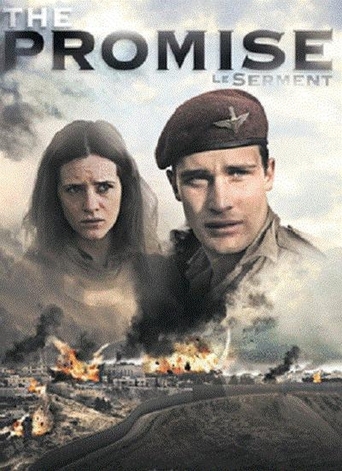nothingisforbidden
What did I learn from watching The Promise?Palestinians are warm, family-loving, loyal, peaceful, noble people, rich in spirit. Even the best Jews are hapless dupes of an evil police state; the rest are cold, heartless, scheming, violent and greedy—the opposite of noble.And the Brits? God bless those Brits! They are a wise and altruistic people who once ran a worldwide empire purely as an act of selfless philanthropy, bringing civilization and maintaining peace among lesser peoples. If only the Brits still ruled the world!Seriously, there is not a Palestinian in this movie who is not noble. And not a Jew who is not ignoble. The Brits are a bit more mixed—one of them, after all, falls for a Jewess and becomes yet another pawn in their evil scheme. But our British hero and heroine are shining examples of a type known in another era as the Ugly American—know-it- all buttinskys who think they possess an unerring moral compass and feel obliged to stick their noses in other people's business, certain that only they, the Brits, can sort things out. As foreigners abroad, it would never occur to them to simply mind their own business.The leading actors are also very good looking. Kosminsky knows that the surest way to keep an audience watching is to offer excellent eye-candy. But there is no nudity, or even much skin at all. The women are hardly even glimpsed in the love scenes, staying hidden under the sheets. The Promise is unusually chaste for a miniseries made in 2011, and I wondered about this, until I realized that Kosminsky deliberately deleted any naughty bits so as not to offend any prudish Palestinian members of the audience.As filmmaking, The Promise is above average. I'd give it a solid six stars. As propaganda, its scores nine (negative) stars, because being duped into watching propaganda puts me in a bad mood. That's a net negative three, which can only be scored here as one star.About halfway through this four-parter, I still hoped the story might resolve in a nuanced and morally complex manner worthy of the thorny material—the sort of story we get from the best of le Carré or Graham Greene. But by the end, there is no ambiguity. There are good guys and bad guys—and a filmmaker with a clear agenda.
johnbirch-2
The only thing I ever learnt about this period was from my RE teacher at school (well, we called it "Divinity" - it was that sort of school) who served in Palestine and missed the King David Hotel bomb by chance, and by minutes. Other than that... nothing. Even for the "small wars" of the British Empire, this is one of the most silent. Some hundreds of British troops died - and we know nothing about it.What is more the Israel/Palestine dispute is on TV News all the time, even though 99% of us no absolutely nothing about the background.Its interesting that there are disputes about its historical accuracy. Leaving aside the fact it is a drama, it does seem to be remarkably accurate. While watching it I was constantly checking - and the events this is based on actually happened. Compelling, moving, educational, and yes controversial. But unmissable.
siholdam
Never mind the cinematic problem with switching between time periods, instead focus on the problem of offering up an interpretation of history this is stewed in contemporary sensibilities. No wonder hate crimes against Jewish people have increased - this biased portrayal helps to explain why. It was laboured and obvious - though the amazing coincidences made it more Alice in Wonderland than Alice attempting to illustrate how the Israeli's just following orders... the one sided attempt to portray Jews as little better than Nazi's was crude and inaccurate. The other reviews on here suggesting it was "historically accurate" need to take a closer look at history, or try dropping the one sided interpretation. It's a shame the director did not do the same before making this film... oh hang on, it wouldn't have been made if it didn't portray Jews as the victims turned villains. I am no defender of the Zionist position on the occupied territories - it is an illegal occupation - but this series lacked balances and that makes it part of the myth making that fuels hate.
Cmbh
I very much enjoyed parts of the Promise, but thought a great deal of it was basically crap.The immediate post war aftermath in Palestine is a very good setting for a film/TV series and is a little known period in history for the general public. I thought the story set there was very compelling, with a good protagonist and remained balanced until the final episode.In contrast the framing device of the girl reading her grandfather's diary was poorly constructed and meant we had to spend far too much time in the company of a girl whose only expression was a sullen pout. At times this became absolutely ludicrous, like her reason for wanting to visit Hebron 'to see how her grandfather's story turned out'. It's not that big a diary, unless you are the world's slowest reader you could read it cover to cover in a few hours. It was also a far less balanced story, with characters presenting as fact only one side of deeply controversial issues. Take the security barrier, condemned as useless for security reasons, and yet suicide bombings plummeted after its construction.Talking about bias, we then come to the final episode, which presented the start of the arab-israeli war of 1948 as purely of poor helpless Arabs being slaughtered by Israelis. Both sides committed atrocities against civilians in the build up to the war and the war itself saw 2,400 Jewish civilians lose their lives. A far more interesting story might how a militia of only 30,000 Jews (at the start of the war) held back the armies of the Arab world.In conclusion a good historical drama let down by its bias and framing device.


